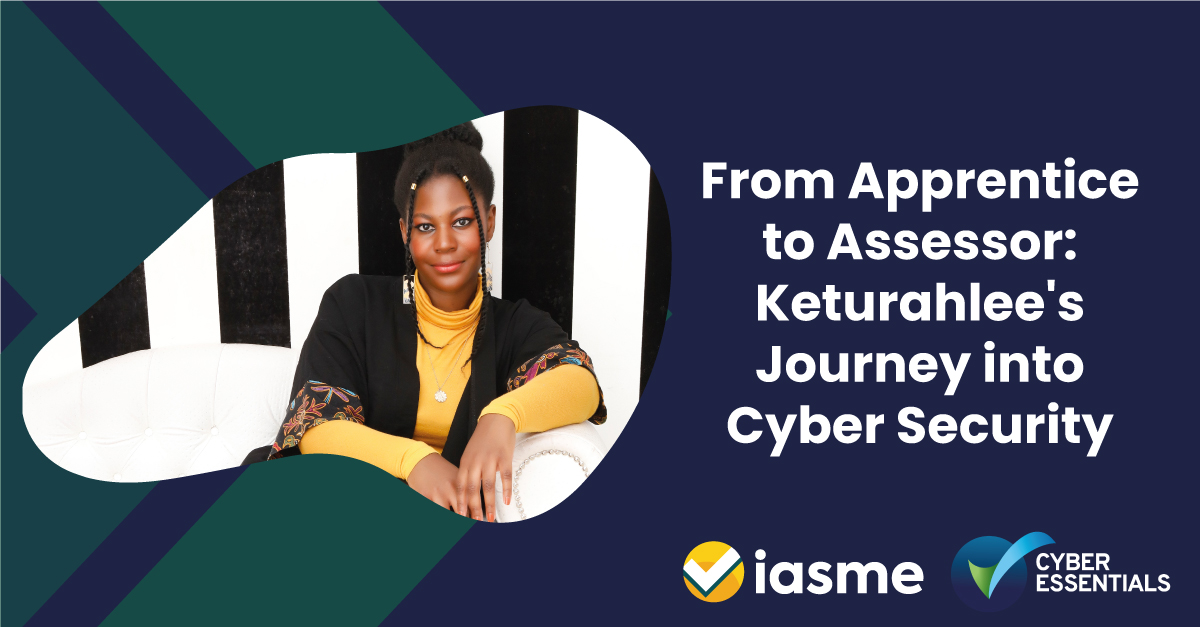A Kickstart into Cyber security
Keturahlee Coulibaly graduated from the University of Bradford in 2020 with a first class honours degree in Computer Science and Cyber Security. Amidst the challenges of the Covid pandemic, there were very little opportunities on the job market and despite her excellent academic achievement, Keturahlee struggled to find employment. Signing up for Universal Credit opened the door to the UK Government-funded Kickstart Scheme that provided six months of paid work placement for young people at risk of long-term unemployment. Many of IASME’s small Certification Bodies were able to access the Kickstart scheme, thanks to IASME’s ‘gateway’ role and Keturahlee was offered a placement with Astrix, a small but dynamic Cyber Security consultancy.
Overcoming Industry Challenges
The cyber security sector faces a global shortage of skilled professionals; it also has significant diversity shortfalls, underrepresenting many, especially those of different socio-economic backgrounds, where great talents are often missed and neglected. Despite this shortage, it can be difficult for those talented people to find an entry level job when they don’t yet have any experience. Keturahlee worked hard at Astrix to gain the necessary three years industry experience and knowledge before she was able to take the Cyber Essentials Assessor course and she is now working to support and assess clients in Cyber Essentials.
We spoke with Keturahlee about her journey from apprentice to Cyber Essentials Assessor and what advice she has for other young people looking for a career in cyber security.
Keturahlee, how would you describe your current role at Astrix?
“I work as a cyber analyst and an account manager, overseeing the various stages of cyber security audits and report writing and helping clients navigate threats and vulnerabilities. My work includes managing client relationships, ensuring compliance with ISO guidelines, and educating MSP partners and their customers about cyber security best practices. Collaboration and knowledge sharing are very important in this field and my job involves a lot of problem solving. Asking for help is essential for success.”
What are your career goals?
“I am not short on ideas about the future because I think anything is possible. There are opportunities everywhere, and it’s not dependent on where you were born or grew up. I like technology; I see it as a real tool, and I’d like to work with tech to make an impact and help people. But it has to be secure; we really need that first – think of an idea, then think of how that can be secure.”
What are the three most important skills you use in your role?
“Problem-solving, effective communication, and organisational skills.”
What advice would you give to someone thinking of pursuing a career in cyber security?
“Go into the environments where cyber security is being practised and discussed. For example, you can do plenty of networking on LinkedIn and within conferences and trade shows that are open to the public. You can talk to companies that are in the sector and ask them, what do you do? what roles are there? do you have any job openings? You will also get the vibe of what is out there in the industry, and whether you want to work with them.
In my second year of computer science, we had to co-discipline. At that time, cyber security was the last option on my list, why was that? I initially perceived it as being too difficult and thought it would be way over my head. My tutor said, “why don’t you try cyber security? they’ll train you. It’s not always about what you know; it’s about what skills you can bring, such as adaptability or problem-solving.” It’s also worth bearing in mind that there’s a shortage in cyber security; they need more people and I think you should always go where you’re needed because then there are opportunities.
You don’t necessarily need knowledge in cyber security or tech to get into cyber security. Many companies are interested in those who have a diverse and unconventional background. Security isn’t just about tech, it’s about people too, so you can come from a different discipline if you are willing to learn and grow and have transferrable skills. Cyber security jobs often have plenty of on-the-job learning and mentorships, you can look out for apprenticeships, degree apprenticeships, entry level jobs on LinkedIn, Gradcracker, internships in the UK and abroad and roles advertised on government websites. Opportunities can be anywhere.”
Astrix founder, Mostyn Thomas says, “As one of our Assessors, many of our clients benefit from not only Keturahlee’s skills in the Cyber Essentials standard, but her ability to share her considerable experience in the managed service provider space. I would definitely say that Keturahlee is a role model in our industry and as a team we are extremely proud of her achievements”.


